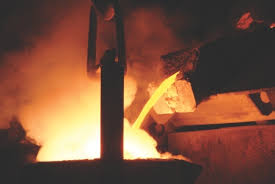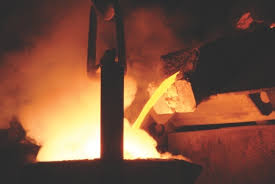What's the Highest Melting Point of Elements and Metals?

Introduction
Metals and elements with high melting points are essential in various industries, including aerospace, manufacturing, and nuclear energy. Their ability to withstand extreme temperatures without losing structural integrity makes them valuable for high-performance applications. Understanding which elements have the highest melting points and why can help engineers and scientists select the right materials for extreme environments.
This article will cover the melting points of metals, their significance, and a comprehensive list of elements, metals, and alloys with the highest melting points.

What’s the Melting Point of Metals?
The melting point of a metal is the temperature at which it transitions from a solid to a liquid. This value varies significantly depending on the atomic structure and bonding strength of the element. Generally, metals with stronger atomic bonds, such as transition and refractory metals, have higher melting points.
Metals with high melting points are used in applications where exposure to extreme heat is common. These include rocket engines, industrial furnaces, electrical components, and nuclear reactors.
Why is the Metal Melting Point Important?
The melting point of a metal is a critical factor in determining its suitability for various applications. Here’s why it matters:
- Industrial Applications: High-melting-point metals are crucial in welding, foundries, and aerospace industries where materials must endure extreme heat.
- Heat Resistance: Metals with high melting points can function in environments with temperatures exceeding 1,500°C (2,732°F), such as jet engines and reactors.
- Structural Integrity: These metals maintain their shape and mechanical properties under intense heat, preventing deformation and failure.
- Corrosion and Wear Resistance: Many high-melting-point metals also resist oxidation, making them ideal for harsh environments.
Which Elements Have the Highest Melting Point?
Some elements exhibit extremely high melting points due to their strong atomic bonds and dense electron configurations. These are mainly refractory metals, a category of transition metals known for their heat resistance and durability.
The table below lists the elements with the highest melting points:
|
Element |
Melting Point (°C) |
Melting Point (°F) |
Key Applications |
|
Tungsten (W) |
3,422°C |
6,192°F |
Aerospace, light bulbs, high-temperature furnaces |
|
Rhenium (Re) |
3,180°C |
5,756°F |
Jet engines, rocket thrusters, electrical contacts |
|
Osmium (Os) |
3,033°C |
5,491°F |
Electrical contacts, fountain pen tips, catalysis |
|
Tantalum (Ta) |
3,017°C |
5,463°F |
Electronics, medical implants, corrosion-resistant coatings |
|
Molybdenum (Mo) |
2,623°C |
4,753°F |
Industrial heating elements, military applications, nuclear reactors |
|
Niobium (Nb) |
2,477°C |
4,491°F |
Superconductors, jet engines, nuclear reactors |
|
Iridium (Ir) |
2,446°C |
4,435°F |
High-temperature crucibles, electrical contacts, spark plugs |
These elements are primarily used in extreme environments where conventional metals would melt or degrade.
Why These Elements Have the Highest Melting Point?
Several factors contribute to the high melting points of these elements:
- Strong Atomic Bonds: The elements listed above have strong metallic or covalent bonds that require significant energy to break.
- Dense Electron Configurations: Their atomic structures are tightly packed, making it harder for heat to disrupt their solid state.
- High Energy Requirements: The amount of thermal energy needed to overcome intermolecular forces is significantly higher for these elements.
A List of High Melting Point Metals
Metals with high melting points are critical in industries requiring heat resistance. The table below summarizes some of the highest-melting metals and their common uses:
|
Metal |
Melting Point (°C) |
Melting Point (°F) |
Common Applications |
|
Tungsten (W) |
3,422°C |
6,192°F |
Filaments, furnace parts, aerospace components |
|
Rhenium (Re) |
3,180°C |
5,756°F |
Jet engines, electrical components |
|
Molybdenum (Mo) |
2,623°C |
4,753°F |
Heating elements, military armor |
|
Tantalum (Ta) |
3,017°C |
5,463°F |
Medical implants, chemical processing |
|
Niobium (Nb) |
2,477°C |
4,491°F |
Nuclear reactors, superconductors |
|
Iridium (Ir) |
2,446°C |
4,435°F |
Spark plugs, crucibles |
These metals are frequently used in high-temperature applications where failure due to heat must be minimized.
A List of High Melting Point Alloys
Alloys are engineered materials composed of two or more elements designed for enhanced performance. Some high-melting-point alloys include:
|
Alloy |
Primary Elements |
Melting Point (°C) |
Melting Point (°F) |
Applications |
|
Tungsten-Rhenium Alloy |
W, Re |
3,050°C |
5,522°F |
Aerospace, thermocouples |
|
Molybdenum-Based Alloys |
Mo, Ti, Zr |
2,700°C |
4,892°F |
Nuclear reactors, high-temperature structures |
|
Tantalum Alloys |
Ta, Hf, W |
3,100°C |
5,612°F |
Medical implants, high-performance electronics |
|
Nickel-Based Superalloys |
Ni, Cr, Co |
1,300-1,400°C |
2,372-2,552°F |
Jet engines, gas turbines |
These alloys are designed for durability, corrosion resistance, and extreme heat resistance.
The Melting Points 0f Elements 1-50
|
Element |
Symbol |
Melting Point (°C) |
Melting Point (°F) |
|
Hydrogen |
H |
-259.2 |
-434.6 |
|
Helium |
He |
-272.2 |
-457.9 |
|
Lithium |
Li |
180.5 |
356.9 |
|
Be |
1,287 |
2,349 |
|
|
Boron |
B |
2,075 |
3,767 |
|
Carbon |
C |
~3,550 |
~6,422 |
|
Nitrogen |
N |
-210.0 |
-346.0 |
|
Oxygen |
O |
-218.8 |
-361.8 |
|
Fluorine |
F |
-219.6 |
-363.3 |
|
Neon |
Ne |
-248.6 |
-415.5 |
|
Sodium |
Na |
97.8 |
208.0 |
|
Magnesium |
Mg |
650 |
1,202 |
|
Al |
660.3 |
1,220.5 |
|
|
Silicon |
Si |
1,414 |
2,577 |
|
Phosphorus |
P |
44.2 (white P) |
111.6 |
|
Sulfur |
S |
115.2 |
239.4 |
|
Chlorine |
Cl |
-101.5 |
-150.7 |
|
Argon |
Ar |
-189.3 |
-308.7 |
|
Potassium |
K |
63.4 |
146.1 |
|
Calcium |
Ca |
842 |
1,548 |
|
Scandium |
Sc |
1,541 |
2,806 |
|
Titanium |
Ti |
1,668 |
3,034 |
|
Vanadium |
V |
1,910 |
3,470 |
|
Chromium |
Cr |
1,907 |
3,465 |
|
Manganese |
Mn |
1,246 |
2,275 |
|
Iron |
Fe |
1,538 |
2,800 |
|
Cobalt |
Co |
1,495 |
2,723 |
|
Nickel |
Ni |
1,455 |
2,651 |
|
Copper |
Cu |
1,085 |
1,985 |
|
Zinc |
Zn |
419.5 |
787.1 |
|
Gallium |
Ga |
29.8 |
85.6 |
|
Germanium |
Ge |
938.3 |
1,720.9 |
|
Arsenic |
As |
~817 (sublimes) |
~1,503 |
|
Selenium |
Se |
221 |
430 |
|
Bromine |
Br |
-7.2 |
19.0 |
|
Krypton |
Kr |
-157.4 |
-251.3 |
|
Rubidium |
Rb |
39.3 |
102.7 |
|
Strontium |
Sr |
777 |
1,431 |
|
Yttrium |
Y |
1,522 |
2,772 |
|
Zr |
1,855 |
3,371 |
|
|
Nb |
2,477 |
4,491 |
|
|
Molybdenum |
Mo |
2,623 |
4,753 |
|
Technetium |
Tc |
2,157 |
3,915 |
|
Ruthenium |
Ru |
2,334 |
4,233 |
|
Rhodium |
Rh |
1,964 |
3,567 |
|
Palladium |
Pd |
1,554 |
2,829 |
|
Silver |
Ag |
961.8 |
1,763.2 |
|
Cadmium |
Cd |
321.1 |
609.9 |
|
Indium |
In |
156.6 |
313.9 |
|
Tin |
Sn |
231.9 |
449.4 |
This table provides a comprehensive view of the melting points of the first 50 elements in both Celsius and Fahrenheit.
Conclusion
Elements with high melting points are essential for applications that require extreme heat resistance and structural integrity. Tungsten, rhenium, tantalum, and molybdenum are among the highest-melting elements, used in industries like aerospace, energy, and medical fields.
Understanding these materials allows scientists and engineers to select the best options for demanding applications, ensuring safety, reliability, and performance in high-temperature environments. If you want to know more about elements having the highest melting point, you can visit Advanced Refractory Metals (ARM) for more information.
{{item.content}}
LEVE A REPLY
{{item.children[0].content}}
{{item.content}}






